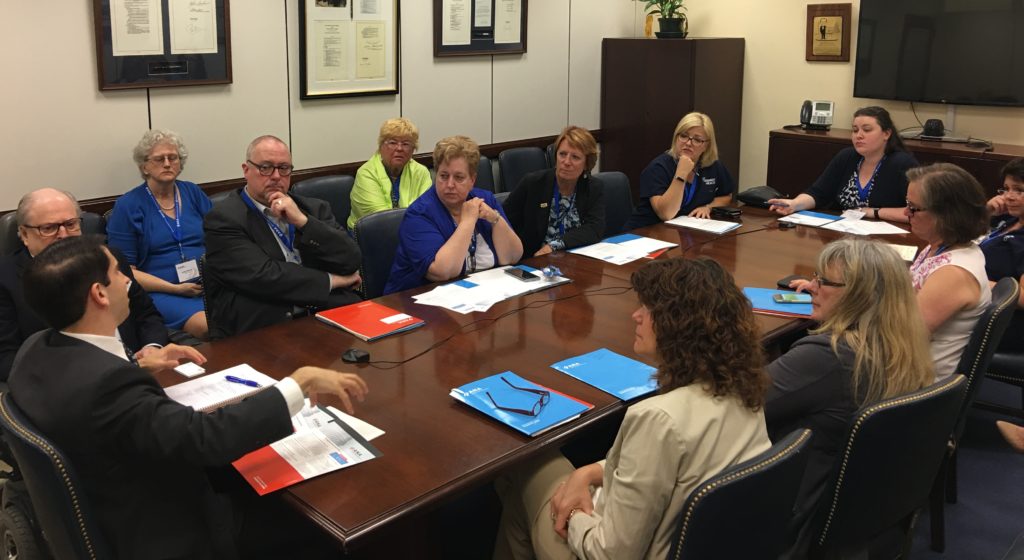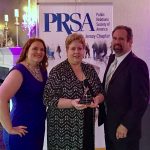N.J. Nurses: Cutting Education Puts Elderly at Risk
NJSNA Advocates on Capitol Hill Against Proposed $146M Funding Cuts
WASHINGTON, D.C.—June 15, 2017—Representatives from the New Jersey State Nurses Association recently advocated against the proposed elimination of $146 million in funding for Title VIII nursing workforce development programs on Capitol Hill.
NJSNA was joined by 427 nurses from around the nation to support workforce development funding and home health services that would directly impact a growing need for geriatric care on June 8, 2017.
“Access to care is a bipartisan issue that impacts all Americans,” said Judith Schmidt, CEO of the New Jersey State Nurses Association (NJSNA). Health care should be focused on wellness, disease prevention, chronic disease management and holistic care. “Nursing education is critical to providing the best possible care. President Trump’s 2018 budget eliminates $146 million from the Title VIII nursing workforce development programs, which will put nurses at an educational disadvantage, especially as our population ages, because of the cost of keeping up their education.”

New Jersey State Nurses Association members discuss nursing education funding with Senator Robert Menendez’s staff in Washington D.C. on June 8, 2017.
Meeting the needs of an aging population
The latest Title VIII funding proposal provides grants to train nurses who provide direct care for the elderly, support geriatric nursing curriculum, train faculty in geriatrics and provide continuing education to nurses who provide geriatric care. The proposed budget was introduced to the Senate in May and the House of Representatives in February.
“I can’t tell you how many horrifying stories I hear from nurses who put their schooling on credit cards or mortgage their homes to advance their skill sets to provide the best care to patients,” Schmidt said. “Nurses are on the frontlines of health care in this country and we need support to be ready to meet the needs of the population.”
The most critical piece of Title VIII for Schmidt is the nurse faculty loan forgiveness because the average age of a nurse educator at an academic institution is 60. “This funding allows for the education of the next generation of nurse educators, which is critical to keeping the profession growing,” Schmidt said.
More than 20 percent of the total U.S. population will be older than 65 by 2029, according to Census reports.
Costs of nursing education prohibitive
Title VIII is the largest source of federal funding for nursing education, offering financial support for nursing education programs, individual students and nurses. The proposed budget cuts target advanced nursing education, diversity grants, National Nurse Service Corp, nurse faculty loan forgiveness and geriatric education.
“With the faculty shortage and the graying of the baby boomers, how does it make any sense to cut funding from preparing the nursing workforce that will be there to meet their needs?” said Benjamin Evans, DD, DNP, RN, APN, PHMCNS-BC, president of NJSNA. “Nurses provide safe, quality, ethical care across the lifespan and often serve in the areas with the least availability of health care providers. Slashing funding shows a major short-sightedness.”
“A lot of nurses can’t afford to go back to school, which holds them back in career development or holds some back from a health care career altogether,” said Schmidt about the grant that funds up to 85 percent of a nurse’s tuition for advancing their education. “Instead of walking out of Rutgers, for example, with $100,000 in student loans, they are walking out with a $15,000 loan.”
It is imperative that Title VIII programs continue to thrive, as the U.S. Bureau of Labor Statistics Employment Projections for 2012-2022 forecasts nurse employment rates to grow by 19 percent, meaning that the nursing workforce will total more than 1 million by 2022. Currently, there are more than 125,000 nurses in New Jersey.
Home health services
Nurses also advocated on Capitol Hill for home health, asking representatives to co-sponsor a bill to allow APNs to certify eligibility and order home health services. Medicare currently prevents advanced practice registered nurses from ensuring appropriate, timely care for their patients. These APN’s are authorized to perform face-to-face assessments of a patient’s needs, but a physician must certify them, adding steps to the process.
“APRNs have proven time and time again that they are high quality independent practitioners and should be able to practice to the full extent of their licensure,” Schmidt said. “They are more than capable of providing high quality, cost effective care especially in home health care and community settings as they are educated to be primary care providers.”
With modifications to Medicare, patients would receive services faster, which would lead to better patient outcomes and ease the burden on caregivers. It would also save millions of taxpayer dollars. The five-year savings estimate is $82.5 million and the 10-year savings estimate is $252.6 million.
NJSNA and ANA joined other national nursing organizations, which represents more than 240,000 APRNs, to call on members of Congress to support these legislative initatives. These include the American Association of Nurse Anesthetists, American Association of Colleges of Nursing, American Association of Nurse Practitioners and the American College of Nurse-Midwives.
###
About NJSNA
NJSNA, which was established in 1901, is a constituent member of the American Nurses Association. The New Jersey State Nurses Association (NJSNA) represents the interests of 125,000 registered nurses and advanced practice nurses as an advocate for the nursing profession. NJSNA’s lobbying arm continues to protect the nursing profession through legislative victories. Its nonprofit foundation, Institute for Nursing, helps nurses further their careers by providing continuing education, scholarships and research grants in addition to invaluable networking opportunities. For more information, nurses can visit www.njsna.org or contact NJSNA at njsna@njsna.org or (609) 883-5335.




